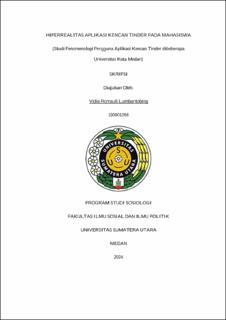Hiperrealitas Aplikasi Kencan Tinder pada Mahasiswa (Studi Fenomenologi Pengguna Aplikasi Kencan Tinder dibeberapa Universitas Kota Medan)
Hyperreality of the Dating App Tinder in Students (Fenomenology Study of Tinder Dating Application Users in Medan City)

Date
2024Author
Lumbantobing, Vidia Romauli
Advisor(s)
Saladin, T Ilham
Metadata
Show full item recordAbstract
The current popular media space is the existence of dating applications such as Tinder. This media brings positive and negative influences, and causes symptoms of hyperreality which shows that the use of this application forms an artificial reality that is more real than the original one. This study examines the phenomenon of hyperreality created by the Tinder dating application among students in Medan City. The research method used is a qualitative research method with a phenomenological approach. Data collection techniques used observation, in-depth interviews and documentation. Research informants were determined using purposive technique. The theory used is the theory of hyperreality by Jean Baudrillard. The results showed that many of them embellish or edit profile photos to attract attention, creating an identity that is more attractive than reality. The expectations formed from these digital identities are often unrealistic, leading to disappointment and emotional impact when meeting in the real world. Users also reported that Tinder influences social and aesthetic standards, with users expecting better appearance and behavior from their potential matches. Although some positive experiences were found, the majority of informants felt that Tinder did not fully reflect the reality in Medan, as many profiles falsified identities. In conclusion, Tinder shapes and maintains expectations based on digital representations, emphasizing the differences between digital expectations
Collections
- Undergraduate Theses [1028]
